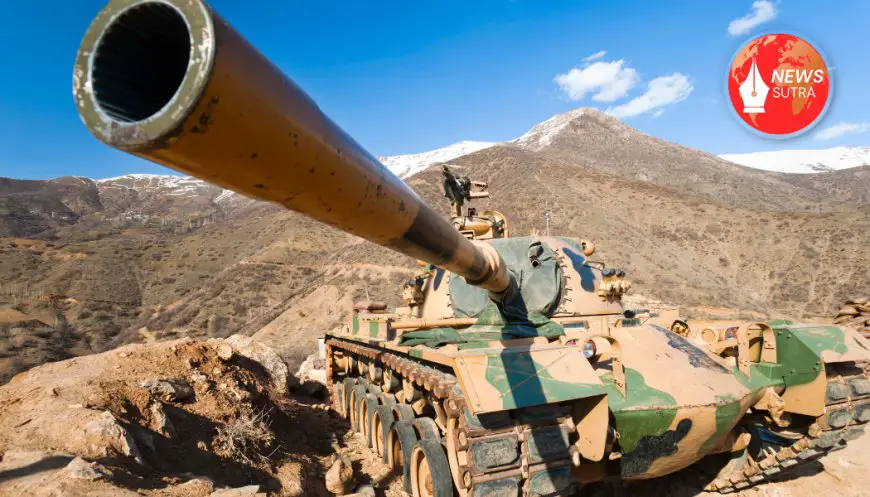Operation ‘Rising Lion’: Israel’s Bold Military Offensive Targets Iran’s Regional Network
Israel launches Operation Rising Lion, striking Iranian military targets in Syria, Iraq, and Lebanon. The move signals a sharp escalation in Middle East tensions.

By Ronald Kapper | June 13, 2025
In a dramatic escalation of Middle East tensions, the Israeli government has launched Operation ‘Rising Lion’, a multi-pronged military offensive targeting Iranian military infrastructure across Syria, Iraq, and southern Lebanon. According to Israeli defense officials, the operation was initiated in response to “imminent threats” posed by Iran-backed militias and alleged weapons transfers to Hezbollah and other proxy groups.
The military campaign, announced late Monday by Israel Defense Forces (IDF) Chief of Staff Lt. Gen. Herzi Halevi, marks one of the most aggressive Israeli operations in recent years and could fundamentally reshape the region’s balance of power.
Targets and Scope: What We Know So Far
According to an official statement from the Israel Ministry of Defense, the first wave of strikes began in the early hours of June 10, focusing on advanced weapons depots, command centers, and drone assembly units operated by the Islamic Revolutionary Guard Corps (IRGC) and Hezbollah-affiliated groups.
The strikes reportedly targeted:
-
Iranian weapons convoys near the Al-Bukamal border crossing between Syria and Iraq
-
IRGC intelligence hubs in Damascus
-
Hezbollah logistics nodes in southern Lebanon, including near Tyre and Sidon
-
Drone and missile sites allegedly developed with Iranian technological aid in western Iraq
Israel also confirmed that several of the attacks involved precision-guided munitions launched from both aircraft and long-range missiles, with aerial support from F-35 stealth fighters.
Satellite imagery released by ImageSat International (ISI) appears to confirm extensive structural damage in multiple locations, particularly in Syria’s Deir Ezzor region and near Hezbollah’s border strongholds.
Why Now? Strategic Timing and Regional Calculations
Military analysts say Operation Rising Lion reflects a strategic preemption doctrine increasingly favored by Israel in the face of growing Iranian entrenchment. In recent months, Israeli intelligence has warned of new missile delivery systems being deployed across Syria and Iraq that could threaten major urban centers like Tel Aviv and Haifa.
“The operation is not about retaliation; it’s about resetting red lines,” said Yaakov Lappin, military affairs analyst at the Begin-Sadat Center for Strategic Studies in a policy brief published last week.
The timing also comes as Iran is dealing with internal unrest and economic instability, triggered by U.S. sanctions and growing dissent over the regime’s foreign policy spending. By escalating now, Israel may be betting that Iran is unlikely to respond with full force, especially with its proxies already stretched across multiple fronts.
International Response: Sharp Divisions Emerge
The response from the international community has been mixed. The United States, Israel’s closest ally, has offered tacit support, with the Pentagon confirming “coordination on intelligence” in a press briefing. However, it stopped short of endorsing the strikes outright.
A statement by the U.S. Department of Defense urged “all parties to avoid further escalation that could destabilize the broader region.”
On the other hand, Russia and China condemned the operation, calling it a violation of Syrian sovereignty. Russia’s Foreign Ministry summoned the Israeli ambassador in Moscow for “urgent consultations,” while Iranian state-run media, such as Press TV, accused Israel of committing “war crimes against resistance forces.”
Iran’s Reaction: Strategic Silence or Calculated Retaliation?
As of this writing, Iran has not launched a full-scale response, though Iranian Foreign Minister Hossein Amir-Abdollahian vowed that “Israel will regret this provocation.” Iran has also placed its regional forces on high alert and reportedly mobilized reinforcements near the Iraqi border.
Pro-Iranian militias like Kata'ib Hezbollah and Liwa Fatemiyoun have issued veiled threats of reprisal, raising fears of retaliatory strikes on Israeli diplomatic and energy interests across the Middle East.
Observers note that Iran may opt for asymmetric retaliation, including cyberattacks or indirect strikes through affiliated groups in Gaza, Yemen, or even Europe, a tactic previously explored according to RAND Corporation reports.
Regional Impact and What Comes Next
The broader implications of Operation Rising Lion are still unfolding. Lebanon has braced for cross-border instability, with schools shut and civilians evacuating border towns. The UN Interim Force in Lebanon (UNIFIL) has urged all sides to exercise “maximum restraint.”
In Syria, civil aviation has been suspended in several provinces, and humanitarian agencies are warning of worsening conditions for displaced civilians.
A senior fellow at the Council on Foreign Relations (CFR) noted that “we are witnessing a tipping point in the Middle East’s proxy wars. The rules of engagement have changed.”
Conclusion: A Risky Gamble or Strategic Masterstroke?
Operation Rising Lion is a calculated escalation by Israel to cripple Iran’s regional ambitions and disrupt its proxy infrastructure. Whether it achieves lasting security or triggers broader conflict will depend largely on Tehran’s next move—and the international community’s ability to contain the fallout.
With both sides entrenched and little diplomatic progress in sight, the Middle East stands on a knife’s edge once again.














